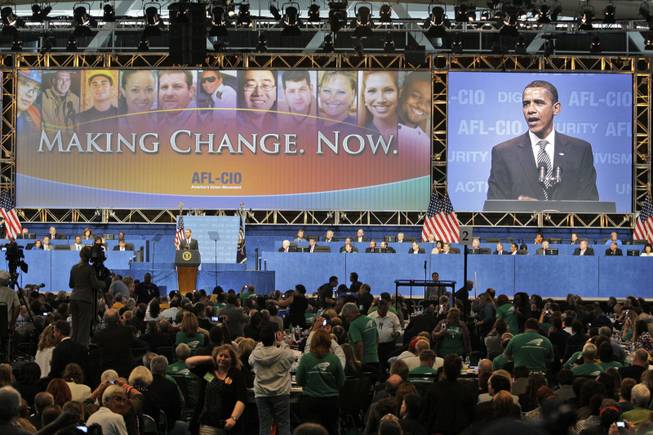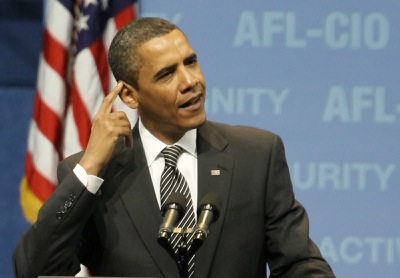
Gene J. Puskar / Associated Press
President Barack Obama addresses the delegates attending the AFL-CIO convention in Pittsburgh on Tuesday.
Wednesday, Sept. 16, 2009 | 2 a.m.
Sun Archives
- Separating reform fact from fiction (9-13-2009)
- Reaction to Obama's speech a glimpse into political divide (9-9-2009)
When President Barack Obama took the stage at the AFL-CIO’s annual convention here Tuesday, he faced thousands of union foot soldiers who were wary of his leadership and Congress’ commitment to the labor agenda.
From the perspective of delegates, health care legislation seemed to be caught up in surface bargaining, destined for a Clinton-era repeat. Labor’s No. 1 priority — a bill that would make it easier for workers to organize — was being dissected and watered down in backroom conferences.
Obama’s mere presence here seemed to allay those concerns, as thousands of labor leaders greeted him with a minutes-long standing ovation, a sort of collective sigh of relief. What followed was a passionate call to arms from a president in need of the critical constituency that helped elect him and place Nevada in his column.
“The White House is pretty nice,” Obama said. “But there’s nothing like being back in the House of Labor.”
After a wilting summer of raucous town-hall meetings and protests, Obama is facing sagging poll numbers and public skepticism about comprehensive health care reform, including a public option that would compete for business with private insurers.
A USA Today/Gallup Poll this week showed Americans almost evenly divided over passing a health care bill, despite the president’s dramatic address to a joint session of Congress last week.
A pair of campaign-style speeches Tuesday, including a stop at an Ohio General Motors plant, was part of an effort to regain traction.
“One of the fundamental reasons I ran for president was to stand up for working families,” Obama said.
“When our middle class succeeds, that’s when the United States of America succeeds.”
Of health care reform, he added, “Now is the time for action.”
Addressing criticism, Obama told the crowd that the stimulus measures his administration had enacted had “stopped our economic free fall” and reminded the audience of labor-friendly actions, including the passage of equal pay legislation, the extension of unemployment insurance, large investments in infrastructure projects and the Cabinet appointments of labor advocates.
He said unions were part of the solution to rebuilding a decimated middle class and pledged to sign the union organizing bill, the Employee Free Choice Act.
John Sweeney, the outgoing president of the AFL-CIO, pledged labor’s support in the health care fight, telling delegates: “The people in this room are the wind at his back.”
Unions see health care reform as key to advancing the labor movement. By taking one of the most contentious and expensive items off the bargaining table, labor leaders argue that employers would be more willing to negotiate first contracts with unions.
The AFL-CIO and a rival labor federation spent nearly $450 million on the presidential race, based in part on Obama’s promise to deliver reform.
Obama seemed to feed off the energy in the David L. Lawrence Convention Center, his performance recalling Candidate Obama of last fall. He closed his speech with his campaign’s famous “Fired up, ready to go” call-and-response and joined delegates in chants of “We can’t wait.”
The performance reassured union leaders such as Mary Goulding, a school district secretary from Green Bay, Wis., who said Obama had taken on the appearance since election of a “smooth-going guy” getting to know the ropes of a new job.
“He’s got his mojo back and we’re on the go now,” she said. “His speech brought back the fire. We can see a future that’s better for our country.”
Michael Goodwin, president of the Office and Professional Employees International Union, agreed. “I was going around saying, ‘Our bill is dead,’ ” he said. “Thank God he put a little meat into the debate.”
The speech was an opportunity for Obama to reconnect with the labor movement — and vice versa.
“We heard what we needed to hear,” said Sandra Schroeder, a community college English professor from the Seattle suburbs and president of the Washington state American Federation of Teachers. “And I think he heard what he needed to hear.”
Mark Baker, a business representative for the International Brotherhood of Electrical Workers in Southeast Missouri, was reinvigorated.
“At some point, the gloves come off,” he said. “And I think Obama’s positioning himself to do that. It adds fuel to the fire for somebody like me.”
Obama will need the help, and union delegates seemed more than willing to give it. AFL-CIO officials said more than 24,000 members attended 400 town-hall meetings in August and that the federation planned to continue the strategy through the fall.
Delegates interviewed by the Sun said they had been rallying their troops by holding health care forums in their union halls, writing and calling congressional representatives and using social networking sites to educate members.
“There’s still strong opposition, and it’s up to us to get health care reform out there and explain what it entails,” said Barbara Jett, a retired kindergarten teacher from Pittsburgh.
Delegates were less enthusiastic about Sen. Arlen Specter, who has been part of a Senate committee negotiating a compromise version of the Employee Free Choice Act. He announced that the group had hammered out a version that will “meet labor’s objectives” and pass Congress this year.
The compromise bill favors speedier secret-ballot elections over labor-favored card checks, wherein organizers collect a majority of union cards to win recognition. It also increases fines for employers who commit unfair labor practices, tripling back pay for workers fired during an organizing drive.
And, according to Specter, the bill includes a form of binding arbitration akin to baseball talks, where, at impasse, both sides submit to a mediator their “last, best” offers.
Although incoming AFL-CIO President Richard Trumka praised Specter for his past support of union causes and Obama endorsed him, delegates questioned the senator’s commitment to labor law reform.
Specter declared on the Senate floor this year that he could not vote for the Employee Free Choice Act. The longtime Republican has since switched parties and is courting labor in a tough primary fight against Pennsylvania Rep. Joe Sestak.
“Elections are won or lost with the support of the AFL-CIO,” Specter said in his speech.
Schroeder and other delegates said they are giving him a hard look. “He’s still on probation,” she said.


Join the Discussion:
Check this out for a full explanation of our conversion to the LiveFyre commenting system and instructions on how to sign up for an account.
Full comments policy